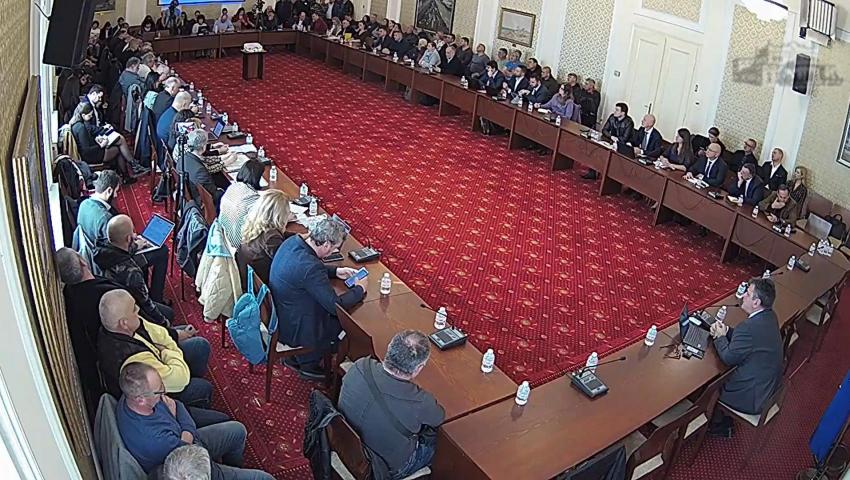Offshore wind meeting fails. For over three hours, fishermen, hoteliers and ecologists expressed their concerns, but the deputies were absent
Organizations and opposition demanded rejection of the bill. Only Delyan Dobrev from GERB listened to the demands of the people

With a series of scandals, a lack of hearings and without key contributors, the discussion of the offshore wind bill took place in the National Assembly building. The initiator of the project - Ivaylo Mirchev from PP - DB did not appear at the event organized by him, and the leading deputy of the event was the doctor Alexander Simidchiev. With such an atmosphere, all those willing to participate in the debates on the production of electricity in the Black Sea remained extremely dissatisfied. And the authors of the draft law were not there because they were "on a business trip", explained Simidchiev at the beginning of the discussion. He stoically endured the catcalls in the hall, which was filled with angry representatives of the hotel industry, fishing associations and environmental organizations.
However, in the middle of the discussion at the meeting, the deputy from GERB Delyan Dobrev came, who listened to the demands of the people that this bill be completely rejected by the deputies. A similar opinion was expressed by Borislav Gutsanov from BSP, who also argued that this bill should be rejected.
In the end, Delyan Dobrev assured everyone present that the bill will not be considered for a second reading in the energy committee until all written opinions of the interested parties are received. According to him, holding the round table in this form is absolutely pointless, and many of the attendees even called the gathering a "circus".
We remind you that the proponents of the draft Law on Energy from Renewable Sources in Maritime Spaces are Ivaylo Mirchev (PP-DB), Delyan Dobrev (GERB), Ramadan Atalai (DPS), Grozdan Karadjov (ITN), Stanislav Anastasov (DPS), Vladislav Panev (PP-DB) and Kaloyan Ikonomov (PP-DB). None of them, except Delyan Dobrev, was able to attend today's meeting and hear the demands of the people from the maritime municipalities.
Irina Mateeva, who is an ornithologist and a member of the Bulgarian Society for the Protection of Birds, asked the deputies to rather focus on transposing the directive on mapping RES zones in Bulgaria. The company also conducted studies on the migration of birds along the wind farms in North-Eastern Bulgaria, and their data show that the birds avoid these regions and fly mainly over the sea. The current offshore wind bill would "push" the birds further into the Black Sea.
Fishermen's organizations are worried about the construction of submarine cables for possible offshore wind power plants, presenting data on how hundreds of hectares of the sea will be closed to professional fishing. This will happen when building wind farms. The associations gave the example of the Galata gas platform, around which there are no more fish, as well as along the route of the gas pipeline, which reaches south of Varna.
Hoteliers, on the other hand, expressed their concerns that no tourists would want to look at wind farms in the sea from their windows. They are adamant that such wind farms will be visible from the coast and will not be built far inland. The reason for this will be the large costs for the construction of a hydroelectric power plant in the deep-water part of the Black Sea.
Martin Vladimirov from the Center for the Study of Democracy presented the CID's forecasts regarding the wind potential of the Black Sea. It turned out that only Bulgaria did not carry out any procedures for regulating the offshore capacity development process. Similar projects are already being developed in Romania, in Greece they have also created their own legislation and already have projects for offshore wind power plants, explained the CID energy policy expert. According to him, it is realistic to build 3-4 gigawatt wind power plants in the Bulgarian economic zone in the medium term. The country's great wind potential is also located in the deep part of the Black Sea. Investments there will also be significantly larger, explained Vladimirov, despite the cheers in the hall. From the study of the CID, four main areas with wind energy potential have been outlined - by the sea of Shabla, Varna, Obzor and in the deep part near the Turkish border.
Bulgaria and Romania can make joint efforts to build joint wind energy projects in this direction. But the regulatory framework for offshore wind is important. Similar projects have been under construction for decades, Vladimirov recalled. According to him, the possible investments in offshore wind in our country amount to about 22 billion euros, which could create 27,000 work places.
